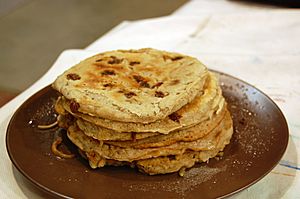Boûkète facts for kids
 |
|
| Alternative names | Bouquette |
|---|---|
| Type | Pancake |
| Place of origin | |
| Region or state | Liège |
| Serving temperature | Hot or cold |
| Main ingredients | Buckwheat flour, raisins, lard |
A boûkète (pronounced "boo-ket") is a special kind of Belgian pancake. It is made using buckwheat flour. People usually cook it in a pan with lard, which is a type of fat. Often, raisins are added to make it even tastier!
You can enjoy boûkètes either hot or cold. They are often served with a local brown sugar called cassonade. Another popular topping is sirop de Liège, which is a sweet syrup from the city of Liège.
Contents
What is a Boûkète?
Boûkètes are a unique type of pancake. They are different from regular pancakes because they use buckwheat flour. This gives them a special taste and texture. They are a popular treat in Belgium, especially in the city of Liège.
Where Does the Name Come From?
The name boûkète comes from the Dutch word boekweit. This word means "buckwheat." At first, the word was used for the flour itself in the early 1600s. Later, around 1743, people started using boûkète to talk about the pancake made from this flour.
In the Walloon region, the original word for pancake is "vôte." But now, boûkète is used specifically for this buckwheat pancake.
How Did Boûkètes Come to Liège?
Boûkètes first arrived in the city of Liège in the 1700s. They were brought by the court of the Prince-Bishops. These pancakes came from an area called the County of Loon and the region around Tongeren in Flanders.
By the end of the 1800s, boûkètes had become a very famous food in Liège. They were known as a true specialty of the city.
When Are Boûkètes Eaten?
Boûkètes are traditionally enjoyed during the Christmas season. People often eat them with mulled wine, which is a warm, spiced wine.
They are also a special part of a festival in Liège. This festival is called the "Free Republic of Outre-Meuse." It happens every year on August 15th. During this celebration, boûkètes are honored as a beloved local dish.
See also
 In Spanish: Boûkète para niños
In Spanish: Boûkète para niños
 | Dorothy Vaughan |
 | Charles Henry Turner |
 | Hildrus Poindexter |
 | Henry Cecil McBay |

